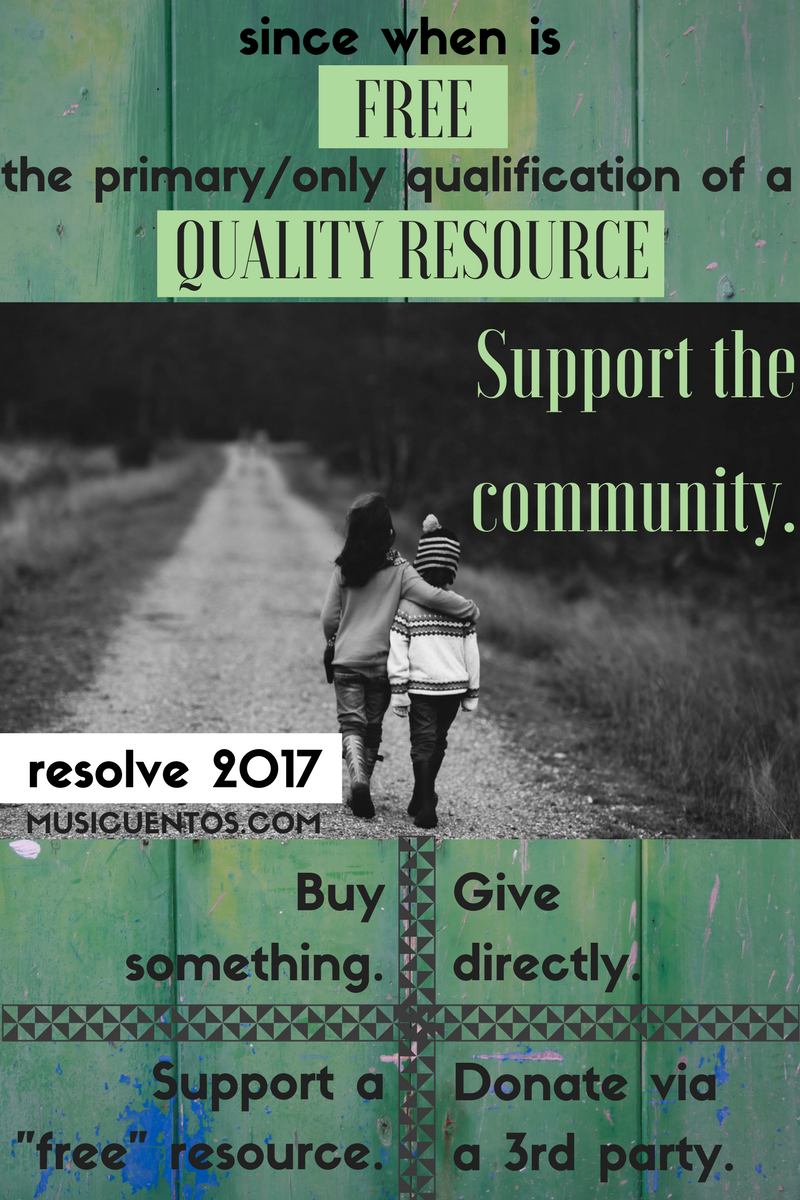Do you remember Napster? Did you use it to download music without anyone contributing to the work the artist and the artist’s team put into it? I did not.
But I’ve got no high horses around here- fifteen years ago, I used a similar “service” (I’m not trying to be coy; I cannot even remember the name of it) to get music on my computer that I didn’t pay for.
I love Free Tech for Teachers as much as the next person, but at some point we’ve got to realize, free never fed anyone’s family. Or sent a teacher to a conference. Or put a FVR library in a classroom.
 At ACTFL last fall, I attended a session on apps for early language learners. The presenter (Karen Nemeth, Language Castle) was very helpful in showing participants how no app is perfect, and some apps aren’t even redeemable, but there are many out there that you can use in strategic ways to help kids improve their language skills. At one point, a teacher asked the question that was probably foremost in everyone’s mind about a particular app:
At ACTFL last fall, I attended a session on apps for early language learners. The presenter (Karen Nemeth, Language Castle) was very helpful in showing participants how no app is perfect, and some apps aren’t even redeemable, but there are many out there that you can use in strategic ways to help kids improve their language skills. At one point, a teacher asked the question that was probably foremost in everyone’s mind about a particular app:
Is it free?
And she gave this great answer:
Since when is FREE the only qualification of a good educational resource?
-Karen Nemeth
I clapped. Alone.
We experience apps like Duolingo, which is free because the founder made his life’s fortune off of the CAPTCHA and reCAPTCHA programs he developed. We use tools like YouTube, which is free because it’s got advertisements plastered all over it. We enjoy programs like Radio Ambulante, which is free because of donors and grants and advertisers. And I wonder if we’ve gotten a little spoiled into thinking that quality is secondary to free (or at least to someone, anyone else paying for it).
So here I come to encourage you to join me in a resolution for 2017 to support the world language teaching community.
There are many ways you can respect and support others’ work without spending any money, especially by always, always striving to respect copyright law:
- Make sure every image you use in any resource (or blog post) is obtained as copyright free (like from Pixabay or Morguefile) or includes the Creative Commons copyright license specified by the author/artist.
- Obtain permission for any resource you include in a project you’re developing. Some, like Facebook or Twitter posts or online menus, are a very gray area because it can be argued there’s no expectation of privacy or you’re not infringing on Pizza Hut Peru’s market share by showing your students part of the menu. But it can never hurt to ask, and especially if you’re putting a price tag on a resource, if you haven’t received permission to use what’s inside for commercial purposes, you could well be breaking the law.
- Don’t ever, ever, ever email a resource you bought to another teacher or upload it on the internet, even if it’s for your students, if it’s in a public place. And if it’s in a private place like an Edmodo group, specify that your students cannot distribute the product in any way, ever. Just ask Martina!
But all that is free and I started this post out talking about the danger of free, right? So what if we supported the community in a very tangible way, from our wallets?
Now, I know that if I make some general statement about my finances like “I want to save more! I want to pay off the car!” then at the end of 2017 I’ll not be much farther toward that goal than I am now. What I need is a system to get me there. You’ve heard it before: choose a concrete step like “Eat dessert no more than twice a week” over a goal like “Lose 40 lbs.”
My concrete step is $10. I’ve actually set my Todoist (which I just started supporting with a premium subscription) to remind me at the beginning of every month to spend at least $10 supporting teachers.
But where?

If you’re looking for ideas, perhaps my list (including other creative people who make my work possible) can help:
Buy something on TeachersPayTeachers.
- I’ll be doing Robo en la noche with my students next fall so perhaps Martina’s Ranas de cristal or Kristy’s El Macao Spix.
- Martina’s Mundo en tus manos is a resource I’d been hoping someone would start creating for a long, long time.
- We’re doing the movie Canela this semester so maybe the Casa Webquest from SpanishPlans or Jason’s marketplace packet.
Buy something independent.
Music lovers: What about a Zambombazo Clozeline ebook?
Game lovers: How about Verba?
PD junkies: Maybe The Language Teacher Toolkit?
Support a “free” resource.
The vast majority of images you see on Musicuentos are obtained free and free of copyright from the talented photographers sharing via Pixabay. High on my list of donation priorities: Hit the “coffee” button for some of my favorites.
Thanks to my #langchat friends I’ve been experimenting a lot with Canva for blog graphics. For the graphic on this post, I paid for a feature (the background) for the first time. A whole $1. (I know, it’s too busy or dark or not enough contrast. I’m not a designer.) But I believe it’s important to deliberately give back to the creative people who help me do what I do.

Have you ever thought about how much benefit you get from Wikipedia? In English or in another language? Have you ever thought about sending them $3 to say thanks?
What about music? I know it’s probably up for free on YouTube. I know the artist makes a lot of money and maybe even spends it on drugs. That’s not your problem. They work hard and pay a whole lot of other people in the process – go ahead, pay $1.99 for a song on iTunes. On my purchase list? Sofia, Soy yo, and anything by ImprintBand.
Give through DonorsChoose.
Go check out the pages of language teachers asking for support on DonorsChoose. You’ll see page after page after page of teachers looking for help to buy books for classroom libraries, add technology resources, attend professional development, send kids to TL culture countries, and more. Most of them aren’t funded at all. They’re just asking, like Allison asked for help with resources and professional development, and got it. What could you do to help them get started?
Give directly to a teacher who has helped you.
I don’t necessarily like or agree with everything in this TED talk “The Art of Asking” by Amanda Palmer, but it’s a super interesting concept nonetheless, in this world of digital content where we want everything for free. Amanda Palmer started giving away her music and asking her fans to support her in return, and it worked, and she got a ton of backlash for it.
It turns out this is a thing: someone recently told me about Patreon and said,
Why don’t you create a page here as a way for the people you help to say thank you?
But, I mean, that’s asking. And like Palmer says, asking makes us vulnerable.
But then I thought about how Kara Jacobs recently added a “Radiohead-style” Paypal button to her site, and how pleased I was that she did, because she’s the person I’d name at the top of the list of teachers who give stuff away that saves other teachers tons of time.
So, I actually emailed Kara and Laura and told them I think they contribute so much to the community, they should create a page on Patreon. If they do, I’ll certainly share them here so you can say thanks, too, if you so wish.
And then, I made my own.
I decided to use Patreon for several reasons.
One: I love teaching and my heart is happier when I’m teaching, but I teach fewer than 20 students one day a week, and I make very little money doing it. My primary income is generated through Musicuentos and the contract connections it has brought me.
Two: Because people have asked. If you’d like a place where you can tangibly and simply say
Thanks for all the years of Musicuentos, Sara-Elizabeth.
without contracting me or coming all the way to a workshop, here you go.
Three: This is tough to say, but I’ve maxed out the amount of time I can spend answering email and reviewing documents people send me. Patreon gives you a place to say, “Hey, I’m thankful you answer every email question and request you get, but I need this in less than six months, so can I pay you for it?” I do still answer every email question and request I get, but it can take me months to get to them.
So, there you go. If you like, check out my Patreon page to join the “Thanks Crew” or get “Amigo Access” today.
7 Comments
Comments are closed.
Great, informative article!. Thanks for mentioning my presentation at the ACTFL conference! Karen Nemeth, languagecastle.com
Karen, I’m so glad you commented and now I can link your website! I could NOT find my notes from that presentation. 🙁
Hear Hear! Thanks SEC for the reminder. My stand on this began early with the use of music in class. I use it for lesson only if I have paid for it via my iTunes Japan account. My images are from a free site – there are so many out there. I tell my students this too – to reinforce to them that ‘someone’ is paying for this even if you aren’t (and how will you feel when it is you?). “Free” isn’t free if you are ripping off someone’s work – just ask Martina!!!
Great habit, Colleen!
[…] Resolutions 2017: Support the Community […]
[…] thought this prompt of free tools was intriguing and I encourage you to read Musicuentos.com post, “Supporting the […]
[…] posted several ideas to answer that question in my 2017 resolution post on supporting the community. (And my to-do item still pops up on the first of every month: spend $10 saying […]